Lincolnshire Integrated Care System (ICS) has a shared ambition for its people to have the best possible start in life and be supported to live, age and die well. To achieve this ambition the ICS’s Clinical and Care Directorate identified a need for a system-wide frailty strategy.
Arden & GEM’s Clinical Support team worked closely with ICB colleagues to bring together a wide range of stakeholders from across health and social care to co-develop a frailty strategy for Lincolnshire. The strategy has already led to the implementation of change initiatives which are improving quality of care, resulting in better patient experience and increasing the focus on prevention and early intervention.
The challenge
Older people with frailty have the highest risk of falls and unplanned hospital admissions, and are also at risk of developing conditions such as anxiety and depression. Identifying people with frailty and putting in place appropriate care and support are priorities for all health and care systems.
Within Lincolnshire ICS, the newly formed Clinical and Care Directorate identified frailty as one of two care areas for transformation focus. The group of clinical and care leaders wanted to develop and embed a system-wide frailty strategy that would support the Lincolnshire community to ‘live well, age well and die well’.
Having previously supported NHS Lincolnshire ICB in establishing the Clinical and Care Directorate, Arden & GEM’s Clinical Support team had the knowledge, expertise and relationships needed to enable the ICB to take forward development of the frailty strategy. The team was engaged in January 2023 to support this ambitious eight-month project.
Our approach
A lead nurse with experience of adult nursing, care of the elderly, governance and policy writing was assigned to the project. The lead nurse would be working closely with the ICB’s Head of Strategic Development for Frailty, Melissa Hall, who was regarded as the driving force behind all frailty initiatives in Lincolnshire.
Stakeholder engagement
One of the team’s initial tasks was identifying and engaging with the wide range of stakeholders who would be crucial in co-developing strategy content. This included leaders and representatives from the ICB’s PHM, engagement, strategy, planning, data and analytics teams. Primary and secondary and social care services were represented by:
- A matron from community services
- Consultant nurses for frailty
- Surgery frailty coordinators
- Special interest GPs
- Ambulance services
- County Council Older Adults Services.
A series of five themed workshops was set up and facilitated to enable collaborative input into the strategy. By linking with Age UK, the workshops also heard directly from service users including a gentleman in his 90s.
The workshop outputs included agreement on strategy objectives, a roadmap of how to achieve these and frailty performance metrics. The inclusion of senior analysts helped to ensure that discussions and decision-making were data-driven.
Learning from others
The development process also included experts from outside of the Lincolnshire system to help build on existing best practice, knowledge and resources. The Ageing Well Programme Director from neighbouring Nottinghamshire ICS took part in the workshops to share their well-regarded frailty strategy.
Clinical Lead for Geriatric Medicine at Guy’s and St Thomas’ NHS Foundation Trust, Dr Adrian Hopper, offered the group his insights from the Getting It Right First Time (GIRFT) programme. While the national Intensive Support Team from NHS England played a key role not just in the workshop series but throughout the entire strategy development process.
Setting up a leadership group
In order to agree and take the strategy forward a Frailty Executive Leadership Group was established. The programme team ensured that the Group included senior leaders from the ICB, County Council, primary care, community services and acute care – all working to an agreed Terms of Reference. Meetings were closely managed with tight agendas to ensure best use of everyone’s time.
Implementing the strategy
With a clinical background and elderly care experience, the Arden & GEM lead nurse was able to not just support the ICS in developing a holistic and integrated strategy but also to implement two key roadmap initiatives.
Falls prevention training: A key strand of the frailty strategy was to work more proactively with care homes around falls. A Non-Executive Director of Lincolnshire Care Association was appointed as a Falls Coordinator and falls training was set up for staff in 80 Lincolnshire care homes.
The training focused on the use of new lifting equipment funded by the Lincolnshire Care Association and used with residents who have had a fall. Regular updates were provided to staff to keep them engaged in the training rollout.
Standardising frailty tool use: Two different frailty tools had been in use across primary care. The Frailty Executive Leadership Group ratified a recommendation to use just one tool (the Rockwood Scale) which is aligned with the new strategy and pathway, and uses a simple approach to categorisation to enable GPs to spend more time talking with patients.
Outcomes
Lincolnshire ICS now has a system-wide frailty strategy in place which has been co-developed with a wide range of stakeholders from primary, community, acute and social care as well as service users and the voluntary sector. The strategy meets the original objective of supporting the Lincolnshire community to live, age and die well.
The resulting transformational change programme has had a positive impact in areas including:
- Improved quality of care
- Better patient experience
- An increased focus on prevention and early intervention.
By taking collective action across a range of organisations within the ICS, patients can now be referred into the right service with equity of access and improved health and wellbeing outcomes.
"It was great having you on board and you can be very proud of how you supported us to develop the frailty strategy for the county. Between Melissa and yourself we navigated our way through any challenges, and with everyone’s input we now have a strategy we can be proud of."
Sarah-Jane Mills, Frailty SRO and Director for Primary Care, Communities and Social Value at NHS Lincolnshire ICB
